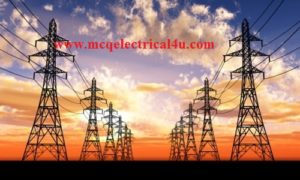
Q.221 The distribution transformer is rated in
A. KW
B. KVAR
C. KVA
D. none of the above
Ans.: C
Q.222 A circuit breaker, under normal conditions, should be inspected
A. every day
B. every week
C. every month
D. once in 6 month or 12 month
Ans.: D
Q.223 A 3-phase induction motor is
A. essentially a constant speed
B. a variable speed motor
C. very costly
D. not easily maintainable
Ans.: A
Q.224 For higher efficiency of 3-phase induction motor, the slip should be
A. Large
B. very large
C. as small as possible
D. one
Ans.: C
Q.225 Which of the following inductors will have the least eddy current losses?
A. air cored
B. iron cored
C. wooden cored
D. laminated iron cored
Ans.: A
Q.226 When p.f is improved, the KW capacity of alternator is
A. increased
B. decreased
C. unaffected
D. none of the above
Ans.: A
Q.227 The initial cost of equipment is Rs. 10000.00 and its scrap value after useful life is zero. The annual rate of depreciation is 10%. Using diminishing value method, the depreciation charge for second year is
A. Rs. 1000
B. Rs.500
C. Rs. 900
D. Rs. 750
Ans.: C
Q.229 A circuit breaker that opposes the change in circuit voltage is
A. Resistor
B. Inductor
C. capacitor
D. All of the above
Ans.: C
Q.230 The power factor of an ordinary electric bulb is
A. zero
B. unity
C. slightly more than unity
D. slightly less than unity
Ans.: D
Q.231 A transistor converts
A. d.c power into a.c power
B. a.c power into d.c power
C. high resistance into low resistance
D. none of the above
Ans.: A
Q.232 Nichrome is an alloy if
A. silver, copper and nickel
B. aluminum, tin and copper
C. nickel, chromium and iron
D. chromium, aluminum and copper
Ans.: C
Q.233 a 100 watt light bulb burns on an average of 10 hours a day for one week. The weekly consumption of energy will be ___ KWh.
A. 7
B. 70
C. 0.7
D. 0.07
Ans.: A
Q.234 An isolator is designed to open a circuit under
A. Full load
B. normal condition
C. no load
D. none of the above
Ans.: C
Q.235 The purpose of the starter is to
A. limit the starting current
B. limit the speed
C. protect against over voltage
D. produce back emf
Ans.: A